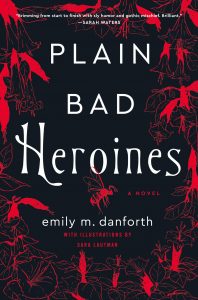I finished this book back in November, but I have frankly been intimidated to review it. This is a big, twisty, ambitious novel that I’m still processing now, but I’m going to give it my best shot.
I have been eagerly awaiting this book ever since I finished the last page of The Miseducation of Cameron Post. This is my favourite YA book of all time, and ever since it came out, I’ve been following Danforth online to see what would come next. At some point, she talked about two different books she was working on: one tentatively titled CELESBIANS! and one that followed a copy of The Well of Loneliness throughout time called Well, Well, Well. As the years went on, I thought those had been abandoned, but after reading this book, I can see how they got incorporated into this story.
Plain Bad Heroines is a horror story that begins in a girls’ boarding school in 1902. There, a writer named Mary MacLane is getting a cult following. MacLane was a real-life figure who published her scandalous memoirs, now titled I Await the Devil’s Coming. They are feminist, bisexual, and blasphemous. (The ARC came with a page from Danforth explaining her coming across this author, and how frustrating it is that she only heard of her recently from a footnote.) There are two girls at this school who are particular fans of MacLane, and they sneak off into the woods to read it together (and to make out, let’s be honest). One day, a relative tries to split the two of them up, and they run further into the woods to try to escape. Instead, they stumble on a sprawling wasp nest and die gruesomely. They are found with MacLane’s book beside them, and more deaths begin to be associated with this copy of the book.
More than a century later, a book has been written about this history, and it is being made into a movie, and the women involved in the production begin to feel haunted by the past. There is Merritt, the young (cranky) genius who wrote the original book; Harper Harper, the “celesbian” star of the film; and Flo, a relatively unknown actor playing Harper’s love interest. They’re all queer, and they have a complicated relationship between the three of them. Merritt is critical, Flo feels out of her depth and vulnerable, and Harper tries to keep the peace between them (and hit on them). As they’re filming, though, they encounter mysterious events on set–it’s unclear whether this haunting has continue with them, or whether it’s all part of an immersive Hollywood experience.
That is the very bare-bones description of the plot, but that’s only scratching the surface. We also get the fascinating story of the headmistress’s founding of the school and the feud between the brothers on that land that is said to have started the haunting. There are so many different stories spiraling together, and almost all of them have sapphic characters (including the headmistress and her partner). The characters are flawed and complicated; they clash with each other.
This is billed as a horror-comedy, and there definitely is wry humor included. It’s self-referential and plays with horror tropes. At the same time, it is creepy and disturbing: you’ll never look at a wasp the same way again. This book is intricate and incredibly well-crafted: I was about two chapters into it when I thought, “Oh, this is how books are supposed to be written.” Even though it bounces around in time and between characters, it all locks together and never feels out of place.
I appreciated the skill involved here, and I love that this is such a queer book absolutely brimming with sapphic characters, but I’m not sure I’d say I enjoyed reading it. It was unsettling. I also felt like I couldn’t quite penetrate through to the core of the story. What started this haunting? What does it mean? I love that there are so many queer characters, but it also means that they are the ones being targeted: why? Is it a metaphor for homophobia? That feels too pat for this story, and it doesn’t quite fit. Is even asking that question too simplifying? I’m not sure I have the skills to unpack everything this story is trying to accomplish.
This is a complicated, ambitious novel that will leave you thinking about it long after you’ve put the book down.

